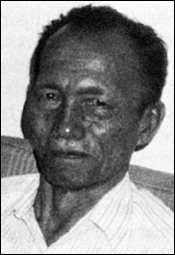
 |
| A. S. Nasution |
A native of North Sumatra, Nasution as a youth showed promise that led to his being chosen for advanced education. The Dutch in those prewar days did not seek to provide universal education but they did select a few Indonesians to be schooled. Along with others who were similarly chosen, Nasution became an ardent supporter of Indonesian independence and one of the revered freedom fighters who resisted the Dutch efforts to regain control of their former colony at the end of the war. As comrade in arms to the leaders of the Indonesian republic, he was appointed to important positions of trust in the new government. In particular he fought in the mountains alongside a Japanese youth, Supoyo, who became secretary general of the ministry of education and culture. The special bond formed between these two became the basis for a close partnership throughout their careers.
Improvements in education became a major priority of the new nation. In contrast to the Dutch colonial administration, the new leaders committed themselves to the rapid establishment of schools in every village and to the development of public libraries throughout the country. Trained as a teacher, Nasution resumed his commitment to education after his nation became free. In his first major appointment to a library enterprise, he served as organizing secretary to the first national conference on libraries, held in 1954. This conference, organized as a part of the historic campaign for the nationwide establishment of libraries under the advisorship of the UNESCO consultant A.G.W. Dunningham of New Zealand, outlined the basic program and structure of Indonesian librarianship. Although the libraries organized by the Dutch for their own purposes largely survived the war, the only public libraries were those that had been designed to serve the ruling elite. The new public libraries were to be established systematically and on a nation-wide basis. Since the mandate was national and controlled from the capital, the public libraries established throughout Indonesia followed national specifications. The result was considerable uniformity as compared with the situation in nations such as India, for example, where the authority to establish public libraries rested with individual states. The quality of leadership at the national level in Indonesia was consequently of critical importance.
Nasution's first operating assignment was to organize school libraries. He later wrote Perpustakaan Sekolah (Jakarta, 1979), a manual on the organization and management of school libraries. When appointed head of the Biro Perpustakaan (Libraries Bureau), he became responsible for the whole infrastructure of school and public libraries throughout the new nation. In that post, he developed plans and procedures that produced an extraordinarily effective network of libraries all over the country. Nasution's program arranged for education of librarians through the nation's library school in Jakarta, through training programs in outlying locations in Indonesia, and through visits and study abroad for key people. Nasution established national standards providing for libraries of specified characteristics in all communities, depending upon size. He oversaw the preparation and publication of detailed regulations and instructions governing these libraries. Manuals of procedure gave guidance to the librarians throughout the country and regular visits by supervisors provided necessary help and ensured uniformity of services and facilities. National grants provided for the construction of libraries and for the building of collections. As a result of these programs developed at the national level, Indonesia's system of public libraries serves the whole nation uniformly and at a notably high level of administrative quality.
Nasution's effectiveness in achieving these results stemmed from his relationship of trust with leaders of the nation, from his self-effacing devotion to the cause of libraries, and from his deep commitment to learning. During his retirement, he remained committed to high standards of education. His impeccable credentials as a fighter for freedom and independence enabled him to serve his nation also by his fearless challenges to developments that he believed were eroding the quality of education. He devoted himself to the establishment of a new non-governmental agency to award annual prizes that promote high quality in Indonesian publications, to encourage the translation of foreign books in order to enrich the publications available in Indonesian, and to publish in popular periodical form some of the best of the world's thought.
The death of a brother-in-law during the Japanese occupation left Nasution with an obligation to care for his sister and her children and delayed his own marriage for many years. Happily, he was married late in life to Nn. Sudariah, head of the Jakarta Public Library, and they were blessed with three children who now range in age from 21 down to 10. In retirement, though he remained active in other endeavors, he found special delight in paying close attention to the education of his children. A man of broad and deep learning, he was one of the great leaders of librarianship in the world.
W. L. Williamson was Professor of Library and Information Science, University of Wisconsin-Madison, until his recent retirement. His master's degree is from Columbia University, and his doctorate from the Graduate Library School, University of Chicago. He was Director, Montclair (NJ) Public library, and a librarian at Columbia University, before going to Madison. He served as a consultant in Indonesia. Dr. Williamson is author of William Frederick Poole and the Modern Library Movement (1963) and many articles on library history and collection development.
© 1994 W. L. Williamson
<